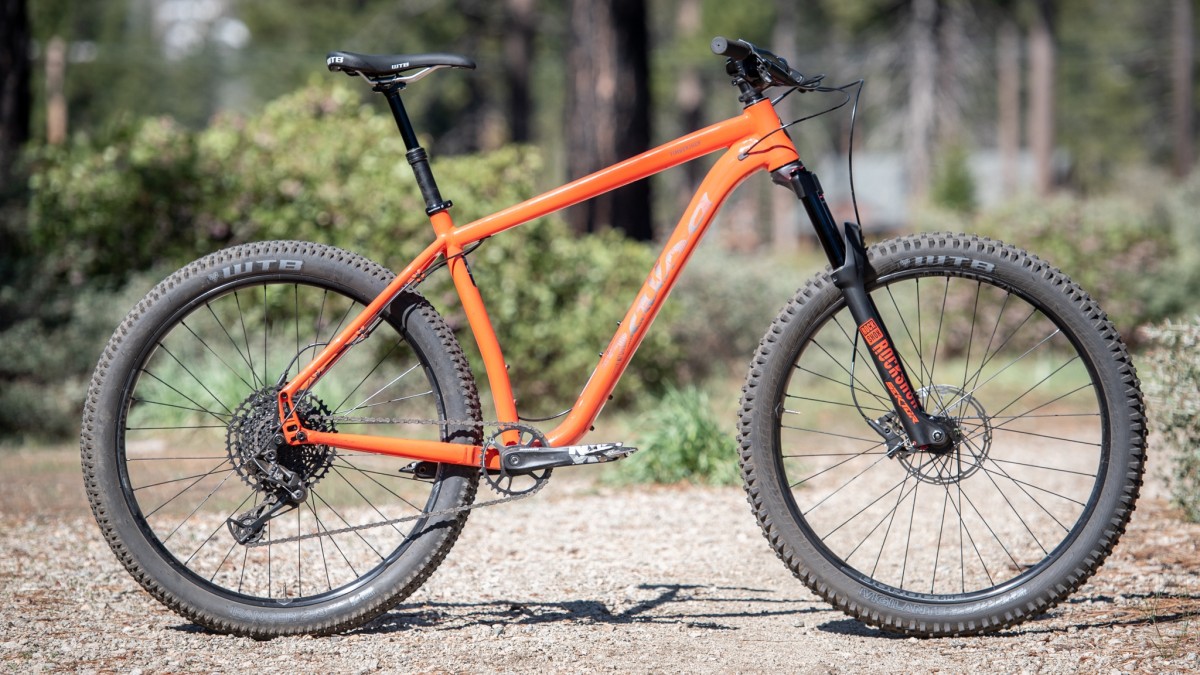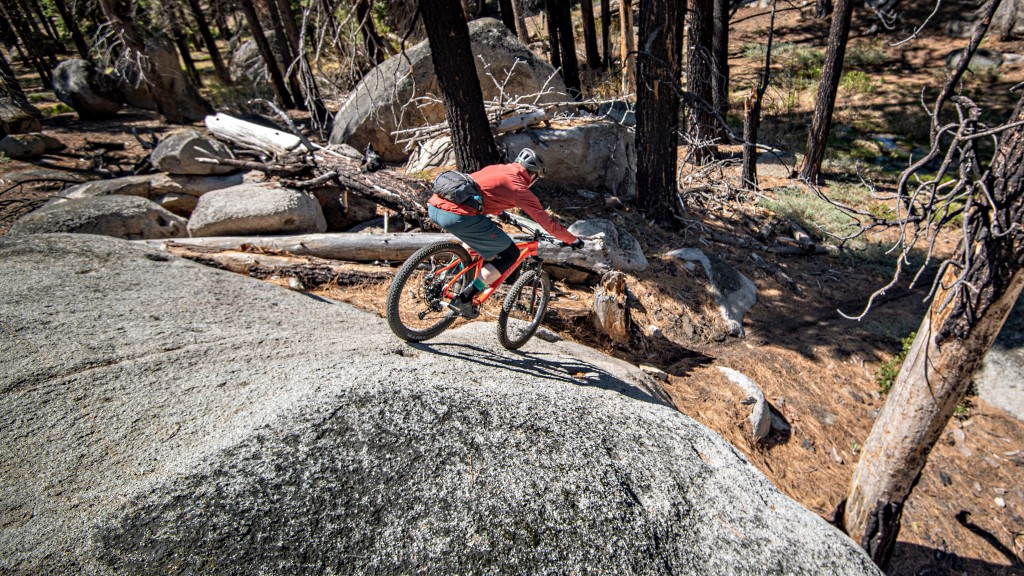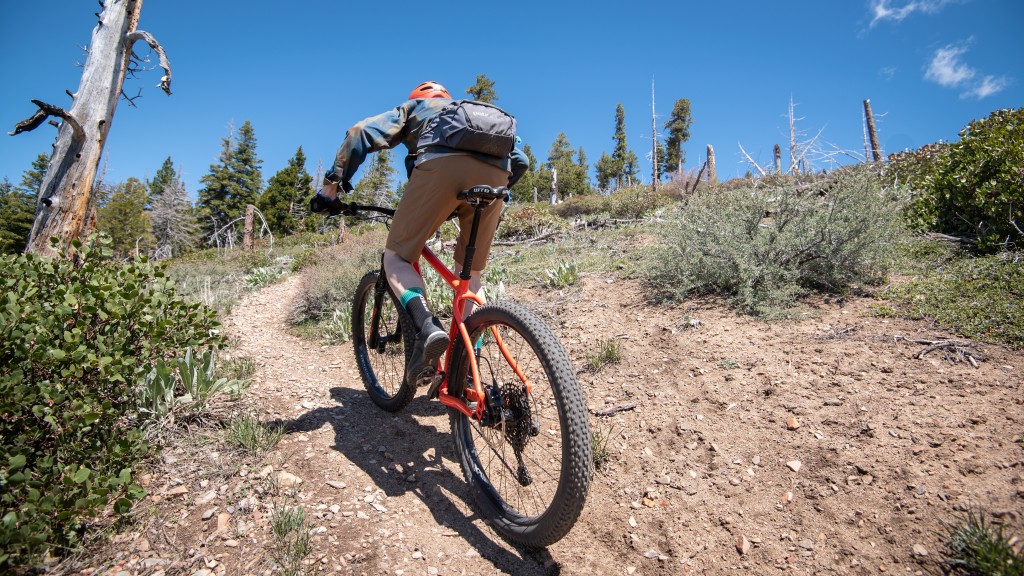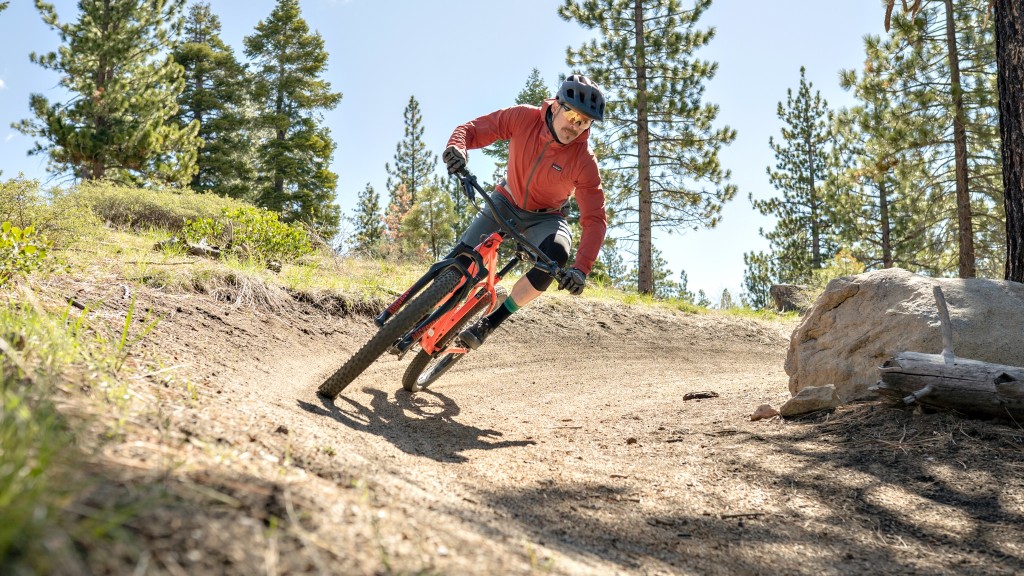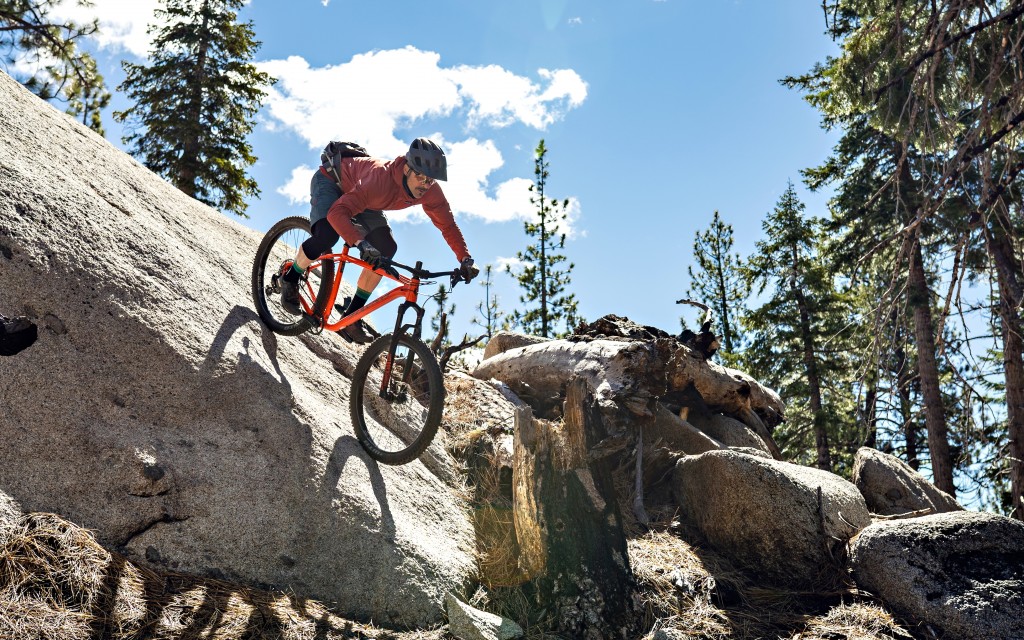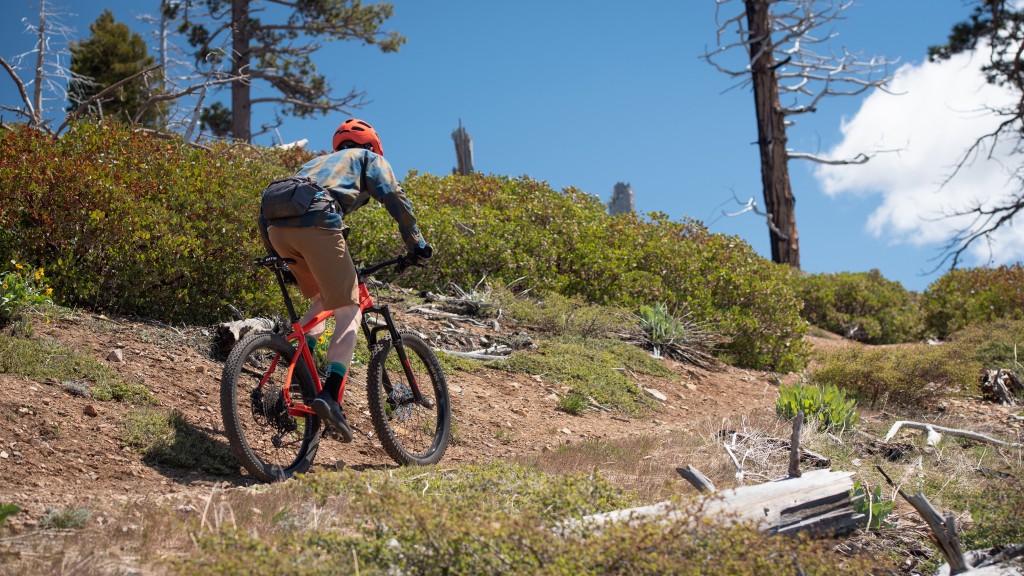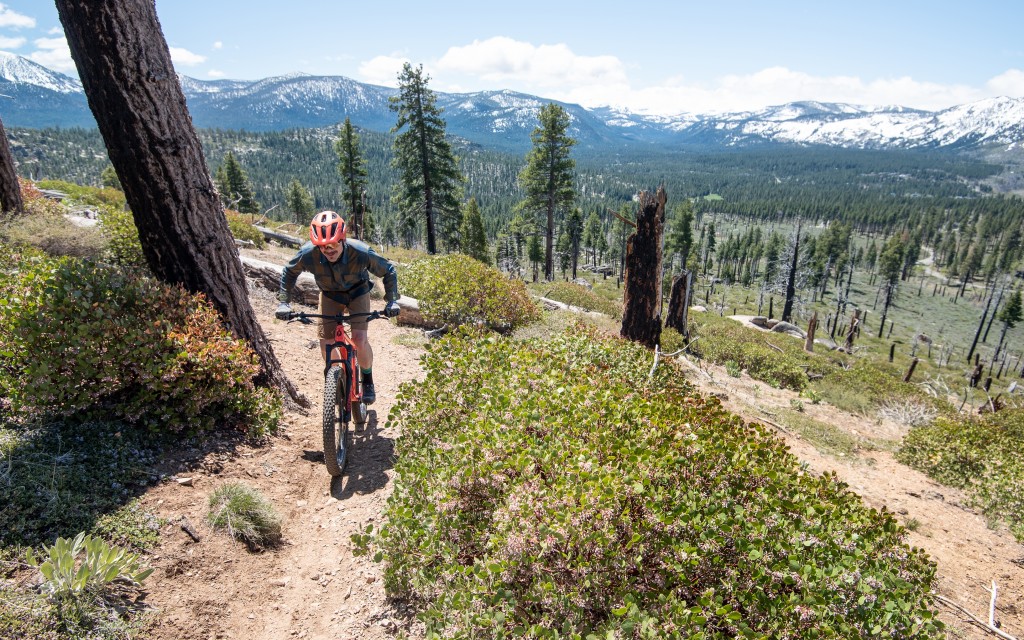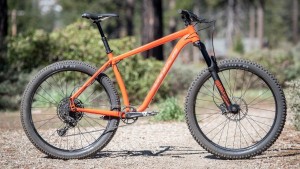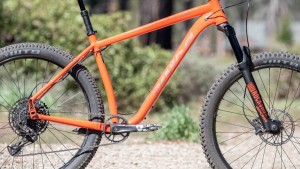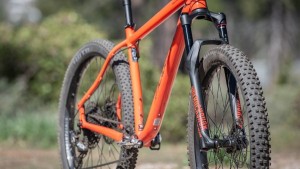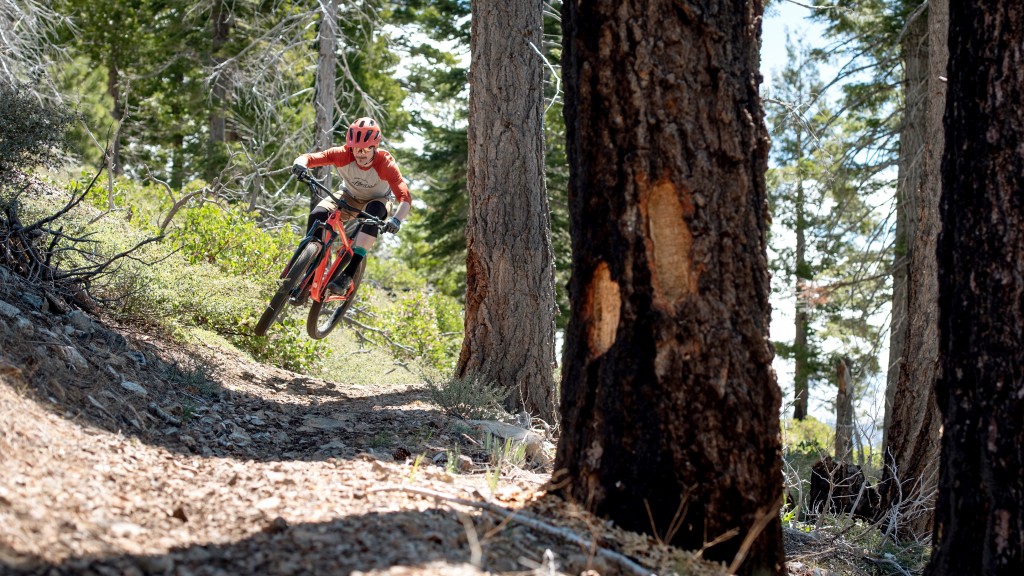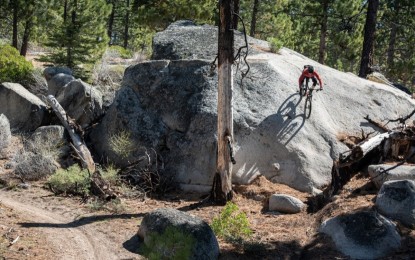Salsa Timberjack NX Eagle 27.5+ Review
Our Verdict
Compare to Similar Products
 This Product
Salsa Timberjack NX Eagle 27.5+ | |||||
|---|---|---|---|---|---|
| Awards | Best All Around Hardtail | Best Aggressive Hardtail | Best For Versatility and Adventure | ||
| Price | $1,999 List | $1,999 List | $1,899 List | $2,099 List | $2,499 List |
Overall Score  |
|||||
| Star Rating | |||||
| Bottom Line | The Timberjack delivers solid on-trail performance and is more than happy to double as a bikepacking rig | With 27.5"+ tires and a moderately aggressive modern geometry, this bike is a total fun hog | A mean and aggressive hardtail with an appetite for high speeds and steep trails | A hardcore hardtail made for aggressive riders and terrain that is slightly hamstrung by several weak points of its build | A versatile bikepacking rig that has the ability to rip trails |
| Rating Categories | Salsa Timberjack NX... | Commencal Meta HT A... | Rocky Mountain Grow... | Norco Torrent A1 HT | Marin Pine Mountain 2 |
| Fun Factor (25%) | |||||
| Downhill (30%) | |||||
| Climbing (30%) | |||||
| Build (15%) | |||||
| Specs | Salsa Timberjack NX... | Commencal Meta HT A... | Rocky Mountain Grow... | Norco Torrent A1 HT | Marin Pine Mountain 2 |
| Wheel Size | 27.5"+ | 27.5"+ or 29" | 29" | 29" | 29" |
| Weight (w/o pedals) | 29 lbs 13 oz | 30 lbs 4 oz | 31 lbs 3 oz | 31 lbs | 33 lbs 15 oz |
| Frame Material | Aluminum | Aluminum | Aluminum | Aluminum | Steel |
| Frame Size Tested | Large | Large | Large | Large | Large |
| Available Sizes | XS, S, M, L, XL | S, M, L, XL | S, M, L, XL | S, M, L, XL | S, M, L, XL |
| Fork | RockShox Sektor RL 130mm | RockShox Yari RC, 160mm | RockShox 35 Gold RL | RockShox 35 Gold RL | RockShox FS 35 120mm |
| Wheelset | SUNringle S.R.C. Duroc 45 | Spank Oozy 395+ rims with Formula hubs | WTB ST i30 TCS 2.0 rims with Shimano MT400 hubs | Stans Flow D rims with Shimano hubs | Alloy Doublewall rims w/ Shimano and Alloy hubs, 32mm ID |
| Front Tire | WTB Vigilante TCS Light/Fast Rolling 2.8" | Maxxis High Roller II EXO, 27.5" x 2.8" | WTB Vigilante TCS Light High Grip 2.6" | Schwalbe Hans Dampf 2.35" | Vee Tire Flow Snap 2.6" |
| Rear Tire | WTB Ranger TCS Light/Fast Rolling 2.8" | Maxxis Rekon EXO, 27.5 x 2.8" | WTB TrailBoss TCS Light Fast Rolling 2.6" | Schwalbe Hans Dampf 2.35" | Vee Tire Co Flow Snap 2.6" |
| Shifters | SRAM NX Eagle | SRAM SX Eagke | SRAM NX Eagle | Shimano Deore M6100 12-speed | Shimano SLX 12-speed |
| Rear Derailleur | SRAM NX Eagle | SRAM SX Eagle | SRAM GX Eagle 12-speed | Shimano Deore M6100 12-speed | Shimano SLX 12-speed |
| Crankset | SRAM NX Eagle PS 32T | SRAM X1 1000 Eagle, 170mm | SRAM SX Eagle 30T | Shimano Deore 32T | FSA Grid 32T |
| Bottom Bracket | not specified | SRAM DUB Threaded | SRAM BSA DUB | Shimano BSA Threaded | FSA Outboard |
| Cassette | SRAM NX Eagle 11-50T | SRAM PG-1210 11-50T | SRAM PG-1210 11-50T | Shimano Deore 12-speed 10-51T | Shimano SLX M7100 12-speed, 10-51T |
| Saddle | WTB Volt Comp | Fabric Scoop Flat Sport | WTB Volt Race 142 | Fi:zi'k Taiga | Marin Pine Mountain Trail |
| Seatpost | Tranz-X JD-YSP15L | KS Rage-I | Rocky Mountain Toonie Drop | Tranz-X YSP18 150mm | TranzX Dropper, 150mm |
| Handlebar | Salsa Rustler, 760mm | Ride Alpha R27 | Rocky Mountain AM 780mm | 6061 Alloy, 800mm, 18mm rise | Marin Pine Mountain Trail Bar, 50mm rise, 780mm width |
| Stem | Salsa Guide Trail | Ride Alpha Freeride 40 | Rocky Mountain 35 AM | 6061 Alloy, 50mm, 35mm clamp | Marin 3D Forged Alloy |
| Brakes | SRAM Level | SRAM Guide T 4-piston | Shimano MT420 4-piston front, MT400 2-piston rear | Shimano MT420 4-piston | Shimano MT520 4-piston front/MT500 2-piston rear |
| Grips | Salsa File Tread | Ride Alpha DH | Rocky Mountain Lock-on Light | VP Lock-on | Marin Bear Paw Locking |
| Warranty | Three Years | Five Years | Five Years | Five Year Limited | Lifetime |
Our Analysis and Test Results
Should I Buy This Bike?
The Timberjack is a sensible option for the rider who wants a hardtail for adventure riding on the weekend and wants to get out for some trail riding with the crew during the week. Riders who are simply looking for a ripping trail bike should look elsewhere. While the Salsa is fun and capable on singletrack, there are significantly better options at this price. Bikepacking, touring, and self-supported adventure riding has exploded in popularity in recent years. The Timberjack was clearly designed to shine on these multi-day missions with carefully thought-out design features. As a result, we would call this a great bike for those bikepacking missions while it is only a decent option for day-to-day trail riding.
If you are seeking a fun hardtail for thrashing singletrack day in and day out, look no further than the Specialized Fuse 29. A version of the Fuse has been our Editor's Choice hardtail for over three years running. The Fuse has an aluminum frame and delivers a very well-rounded ride and is shockingly capable as an all-around trail-riding hardtail. On the descent, the Specialized shreds thanks to its modern geometry, quick handling, and generally solid component specification. While the Fuse is a killer trail bike, riders who want to go on multi-day, self-supported, slogs will still do much better with a bike like the Timberjack.
Like the idea of a bikepacking rig that can double as a trail bike? Do you believe that steel is real? Well, the Marin Pine Mountain is a versatile steel hardtail. The steel frame on the Pine Mountain is comfortable and provides a smooth and damp ride. This added element of comfort can be hugely beneficial on bikepacking missions when you are in the saddle all day long. The redesigned Pine Mountain also has a more modern geometry that is more capable on the descents and the climbs. The frame also features more mounting options than you can shake a stick at, and the build is largely stellar for $2,100 asking price.
Do you prefer your hardtail mountain bikes to have some cross-country DNA? Well the Ibis DV9 is a fast and efficient hardtail. The DV9 is our Top Pick for the cross-country application thanks to its feathery climbing abilities and zippy acceleration. The Ibis has a carbon fiber frame and moves uphill far more effectively than the Salsa. On the descent, the DV9 has a more precise feel and more predictable handling than the Timberjack. Still, the wider tires on the Timberjack deliver a more comfortable ride over rock and chop since you can run a lower tire pressure. Our DV9 NX sells for $2,550 with a high-end carbon fiber frame, killer tires, and a rock-solid fork.
Frame Design
The Timberjack is built around an aluminum frame and is designed around a 130mm fork. This bicycle has an enormous amount of space in the front triangle to accommodate a full-size frame bag. The rear end has a stout look, and this bike has adjustable rear dropouts. This allows riders to lengthen or shorten the rear end. The longer setting would be ideal for putting in big miles and riding long distances while the shorter setting is intended to create snappier handling and a more playful ride.
We measured our large Timberjack and found a 640mm effective top tube and 440mm reach measurement. The head tube angle is 66.6 degrees, and the effective seat tube angle measures 72.3-degrees. The bottom bracket is 320mm off of the ground. The chainstays measure 424mm in the short setting with a 1168mm wheelbase. Our large test bike tips the scales at 29 lbs 13 ounces set up tubeless without pedals.
Design Highlights
- Aluminum frame
- The frame can accept 27.5+(tested) wheels or 29-inch wheels
- 27.5+ max tire size = 3.0-inches
- 29-inch max tire size = 2.6-inches
- Adjustable dropouts/chainstays
- Mounts for three water bottle cages
- Frame bag-friendly
- Boost Spacing
Downhill Performance
The Timberjack delivers a solid, if not thrilling, downhill performance. The 66.6-degree head tube angle is slack enough to feel confident when things get a little steep, that said, this bike does not feel especially stable at speed. Handling is predictable, and steering is fairly confident thanks to the impressive front tire spec. The component grouping is somewhat of a mixed bag, and the flimsy RockShox Sektor fork is a notable lowlight.
When perched in the attack position, the Salsa feels a little tight in the top tube. The 440mm reach measurement is relatively short for a large frame in 2019. When standing up on the descent, your hands feel precariously close to your chest. The 66.6-degree head tube angle is reasonable for a trail-oriented hardtail. It's slack enough to feel confident when pointed down a steep section of trail. That said, the bike feels a little too short to feel stable when the speedometer is cranked up. The 1168mm wheelbase is a bit twitchy when you open it up, and this bicycle didn't inspire testers to push the limits. We fiddled with the adjustable dropouts to lengthen the bike. The wheelbase grew approximately 16mm. We found that it didn't feel substantially different or more confident at speed.
The Timberjack delivers impressive handling on the descent. As we mentioned before, when you're cooking down a trail at Mach 10, it doesn't feel fantastic, but in most scenarios, the handling is crisp. The 2.8-inch WTB Vigilante front tire is a big reason why this bike can handle aggressive movements. When you are slicing and dicing down a technical stretch of trail, the Vigilante has an excellent bite to back up the rider's quick moves. Even in loose and sandy conditions, this bike reacts well to hard cornering and quick snaps of the handlebar. Also, at 29 lbs 13 oz, it is relatively light for an aluminum hardtail with 2.8-inch rubber. This means that it requires a bit less energy and effort to get the bike to react. The Salsa is a surprisingly fun bike. No, it may not be the hardest charger, but the short rear end and quick handling create a surprisingly playful ride. Manuals and trailside shenanigans are encouraged.
The Salsa handles chunky terrain well enough. The aluminum frame has a bit of flex to it and eats up some of the trail surface imperfections. Additionally, you can run the 2.8-inch rubber at a low pressure to provide a little additional damping. We found 19 PSI in the front tire and approximately 21 PSI in the rear to be the sweet spot. This delivers a good balance of traction and damping without feeling sloppy. Lighter riders might be able to get away with slightly lower tire pressures while heavier riders should be wary of dinging and damaging the rim.
The RockShox Sektor fork that comes stock on the Timberjack is a miserable specification. The poor performance plays out in two ways. First, it is difficult, if not impossible, to dial in this fork. You can run it at too low of air pressure and it might feel somewhat plush, but you will be blowing through the travel on mid-size impacts. If you set the fork to proper air pressure, it feels exceptionally harsh and clunky. Second, the 32mm stanchions create a floppy and flimsy feel. When you are riding rough trails at a decent pace, you can feel the flex in the fork, once again, not confidence-inspiring. The SRAM Level brakes are serviceable. Power is respectable, but they have a cheap lever feel.
Climbing Performance
The Timberjack is a decent climber that delivers a nice blend of efficiency and traction. The climbing position is comfortable despite a relatively slack seat tube angle. Climbing over technical trail features is surprisingly comfortable and capable. The component grouping works well on the ascent thanks to an NX Eagle 12-speed drivetrain and meaty rubber.
The Salsa sets you up in an okay climbing position that is comfortable for long slogs and bikepacking. The seat tube angle is on the slacker side of the spectrum at 72.3-degrees. This puts the rider's hips slightly behind the bottom bracket and can be detrimental to power transfer although we didn't find it to be a big problem on the Timberjack. Seat tube angles are less of an issue with hardtails, but it is noteworthy as seat tube angle is a huge buzzword in 2019. The cockpit feels decisively tight. The 440mm reach is short and can feel a little bit cramped on steeper pitches. Salsa likely uses a shorter reach to keep the rider in more of an upright position and not stretched out too much. This makes a lot of sense for bikepacking and long distances when you're in the saddle all day and comfort is critical. This tight cockpit is not a great trait for a trail bike.
The Salsa scoots up and over technical pitches remarkably well. The 2.8-inch tires deliver excellent traction. Even on off-camber sections, you can almost hear the copious amount of grip coming from the tires. As we mentioned in the downhill section, the wide rubber also works to provide a little bit of extra damping. This can make an enormous difference on the ascent where you don't want to get kicked off your line by firm tire pressure. Even with a little extra cushion, it is best to get out of the saddle over rocks and roots. This saves your body a little bit of jarring and pays off over a long ride.
Overall, the Timberjack delivers sharp handling on the climb. That said, multiple testers had a hard time keeping the front end planted. The short chainstays made the bike want to loop out on steep pitches. This was especially noticeable when turning through a steep corner. The short chainstays push the axle forward under the rider's weight which makes it more challenging to keep the bike from doing a wheelie on steep trails under pedaling loads. We lowered the stem as far as we could to try to force more weight over the front end and keep the front wheel planted. This was helpful but didn't make a significant difference.
Climbing efficiency is respectable. This isn't a bike that you would want to enter in a cross country race like the 26.5-pound Ibis DV9 or the 26.75-pound. Trek Stache 9.7. That said, we would have no problem riding this bike all day long. This nearly 30-lb bike doesn't have the same zippy, peppy, acceleration as the DV9, but it never feels like too much of a pig. Given its intended bikepacking application, it makes sense that Salsa never designed this bike to be a featherweight. The best approach to climbing on the Timberjack is to take your time and grind it out.
Photo Tour
Value
The Timberjack NX 27.5+ carries a $1999 price tag and represents a decent value. As a trail bike, the Salsa delivers average performance. We expect this bike to function much better as a bikepack/adventure rig. Regardless, we appreciate its versatility and could be a strong value for the right buyer.
Conclusion
The Salsa Timberjack is a bit of a niche bicycle. It is hard to recommend it to average trail riders. No, this bike won't blow you out of the water on a trail ride. Even so, climbing is predictable and comfortable while downhill performance is reasonably confident. Even if it isn't the best choice for a daily driver, it is still a fantastic option for bikepacking missions and multi-day, self-supported, rides.


